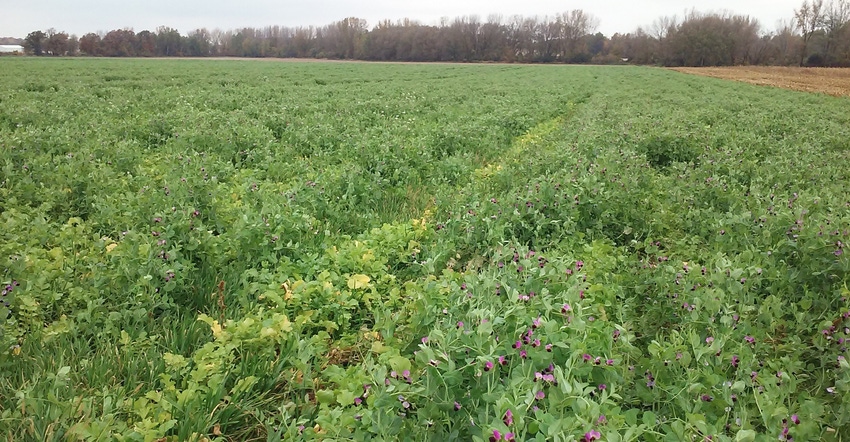March 1, 2021

U.S. Sens. Tammy Baldwin, D-Wis., and John Hoeven, R-N.D., have introduced the Feed Emergency Enhancement During Disasters with Cover Crops (FEEDD) Act, bipartisan legislation to provide farmers and ranchers with additional flexibility to alleviate feed shortages in years with widespread excessive moisture, flooding or drought.
The bill would:
Emergency waiver. Create an emergency waiver authority for the secretary of agriculture to allow for haying, grazing or chopping of a cover crop on prevented plant acres before Nov. 1 in the event of a feed shortage due to excessive moisture, flood or drought.
No effect on insurance. Under this waiver, producers would not see a reduction of their crop insurance indemnity.
Regional dates. Direct the secretary to establish regional haying and grazing dates for each crop year.
Help for Upper Midwest. The current date, Nov. 1, is set on a nationwide basis and disadvantages producers in the Upper Midwest. This would provide flexibility for the secretary to move up the haying and grazing date for Northern states, including Wisconsin.
No effect on APH. Maintain crop insurance program integrity and will have no impact on a producers’ actual production history.
We support the bill because it will give farmers more certainty about their feed options in disaster years.
“In Wisconsin, when farmers lose a crop to flooding, drought or other extreme weather events, they are left with tough choices about how to make up for crop losses and protect their soil from erosion,” Baldwin says. “By reducing uncertainty for farmers, we’re working to ease one of the headaches they face when deciding about putting in cover crops, which will benefit soil health on the farm and water quality in our communities.”
Reps. Dusty Johnson, R-S.D., and Angie Craig, D-Minn., are introducing companion legislation in the House. With bipartisan support, hopefully, this bill will quickly pass both houses of Congress and be signed into law.
Groups support bill
In Wisconsin, the bipartisan FEEDD Act is supported by a number of groups, including:
Wisconsin Farmers Union
Wisconsin Farm Bureau
American Farm Bureau Federation
National Farmers Union
National Cattlemen’s Beef Association
National Milk Producers Federation
National Association of Conservation Districts
American Soybean Association
Edge Dairy Farmer Cooperative
Farm Credit Council
FarmFirst Dairy Cooperative
American Bankers Association
Independent Community Bankers of America
U.S. Cattlemen’s Association
National Sustainable Agriculture Coalition
Ag Retailers Association
Leaders back bill
The following ag leaders voice their support for the bill:
Darin Von Ruden, Wisconsin Farmers Union president. “Rising average temperatures, shifting precipitation patterns, changing growing seasons, and increasingly frequent and severe weather events are making it more difficult to grow food, feed, fuel and fiber. The effects of climate change are becoming clear across rural America, and the past few springs have been especially challenging for family farmers and ranchers. In many areas across Wisconsin, it has been too wet to put seeds in the ground, forcing many farmers to rely on prevented planting insurance coverage to make ends meet.
“While prevented planting offers a critical risk management tool, the Nov. 1 harvest date prevents many farmers from utilizing a “second crop” as forage. Wisconsin Farmers Union thanks Sen. Baldwin for introducing the common sense, bipartisan FEEDD Act, which provides the flexibility family farmers and ranchers need as they prepare for future planting and growing seasons.”
Kevin Krentz, Wisconsin Farm Bureau president. “Wisconsin Farm Bureau is appreciative of U.S. Sen. Tammy Baldwin’s introduction of the FEEDD Act. Recently, dairy and livestock farmers in Wisconsin and parts of the Midwest experienced substantial feed shortages due to winterkill of alfalfa. This legislation will give flexibility to the USDA secretary in the event of a feed shortage due to increased weather variability. Wisconsin farmers welcome the passage of the FEEDD Act.”
Jeff Lyon, FarmFirst Dairy Co-op general manager. “FarmFirst Dairy Cooperative applauds Sen. Baldwin’s leadership and support of farmers in managing their farm more fully without program restrictions. The introduction of the FEEDD Act showcases support from both sides of the aisle to provide farmers the flexibility needed to manage their cropping decisions in the event of adverse growing conditions. Placing the tools and resources directly in the hands of farmers is the best way to equip them for success, and making this a permanent piece of legislation is a step in the right direction,”
Brody Stapel, Edge Dairy Farmer Co-op president. “Edge is thankful to Sen. Baldwin and her colleagues for understanding the needs of our dairy farmers. Ensuring that USDA will be able to provide farmers with this flexibility going forward is essential so that our animals are taken care of and food production is not interrupted.”
Jim Mulhern, National Milk Producers Federation president and CEO. “I commend Sen. Tammy Baldwin for authoring the bipartisan Feed Emergency Enhancement During Disasters Act. This bill provides dairy farmers in Wisconsin and beyond with critical tools and flexibility that will help them to manage feed shortages caused by intense flooding and other difficult weather conditions. We look forward to working with Sen. Baldwin to pass this important legislation.”
You May Also Like




